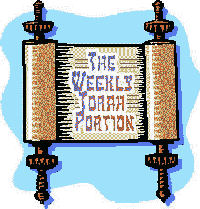Search our Archives:
» Home
» History
» Holidays
» Humor
» Places
» Thought
» Opinion & Society
» Writings
» Customs
» Misc.
|
The Proper Path
By Michael Chessen
The Torah portion of V'etchanan includes a reiteration (albeit with a
few fairly slight changes) of the famous "Ten Commandments" which we first
read in Exodus. This actually makes for the fourth of four "groups of ten"
which we encounter in the Five Books of Moses: at time's beginning, God
created the world by way of ten utterances, Abraham later had to endure ten
tests of his faith, and God visited ten plagues upon the Egyptians.
Rabbinical sages have drawn parallels between these four sets of tens, each
item holding parallel significance to its chronologically corresponding
item in all of the other sets. And it is common among all four sets that
the tenth and climactic item is the most meaningful of its group. Abraham's
tenth and final test was the binding of Isaac and the tenth plague was the
death of the first born. The tenth commandment, however, is "Thou shalt not
covet", commonly understood as a prohibition against envy. Could it be
that this prohibition outweighs those which prohibit adultery and murder?
Leaving aside the idea of parallel importance, a look into the Talmud
reveals that we perhaps do not even understand the plain meaning of "Thou
shalt not covet". On page 75 of the tractate of Baba Batra we learn that
"every man is burned by his fellow's hupa (wedding)". The context of this
statement is that in the world to come, mid-level saints will enviously
view the heavenly reward of higher level saints. The phenomenon of other
worldly individuals succumbing to feelings of envy naturally leads us to
ponder how we of this world are expected to avoid envy. Moreover, one could
even legitimally argue that envy has a positive role to play in our day to
day lives. An individual might see a friend or acquaintance succeeding in
business or scholarship and this could serve him as a kick in the seat of
his pants, telling him:" get up! move! achieve for yourself as well!"
Whereas envy is perhaps a "natural" phenomenon, it would seem that the
true power of "thou shalt not covet" lies not in its manifestation as a
prohibition, but as a guide to awareness, similar to the first commandment
"I am the Lord". However, whereas "I am the Lord" comes primarily to bring
us to the recognition of God, "Thou shalt not covet" shows us how to best
serve God, through happiness. As King Solomon wrote in the Proverbs (17,
22) "A happy heart is good medicine, but a broken spirit dries the bones".
"Thou shalt not covet" could thus be practically viewed as saying that an
individual should not rationalize that whereas so and so has a, b, c and d,
and, therefore, he can be happy, I, the poor wretch, lack a, b, c and d and
therefore cannot be happy. Rabbi Shlomo Carlebach, of blessed memory, used
to say that he did not practice "outreach", rather, he practiced "inreach".
He sought to show people that the true source of happiness emanates not
from without, but from within. We should all strive to follow the path of
inner happiness which surely leads to the gate which King David referred to
as "the gate to God, through which the righteous shall enter."
Wishing you all a Shabbat Shalom !

|
|
Please let us know if you see something unsavory on the Google Ads and we will have them removed. Email us with the offensive URL (www.something.com)
|





|
